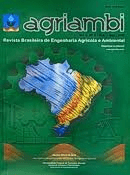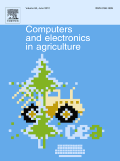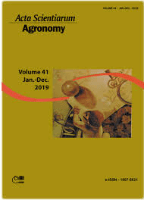
Artificial Intelligence in Agriculture
metrics 2024
Transforming Agriculture Through Intelligent Innovation
Introduction
Artificial Intelligence in Agriculture is a premier open-access journal dedicated to advancing the application of artificial intelligence technologies in the agricultural sector. Published by KEAI Publishing Ltd in China, this journal has rapidly gained recognition since its inception in 2019, boasting an impressive impact factor highlighted by its Q1 rankings across multiple categories in the 2023 Scopus metrics. Aimed at researchers, practitioners, and students alike, it provides a vital platform for disseminating innovative research and practical applications that bridge the gap between AI and agriculture. With a focus on enhancing productivity through cutting-edge AI methodologies, the journal encourages submissions that address the multifaceted challenges in agricultural practices. Whether you are looking to publish your work or explore the latest findings, Artificial Intelligence in Agriculture is an essential resource for anyone committed to fostering sustainable agricultural advancements through technology.
Metrics 2024
 -
- 8.20
8.20 -
- -
-Metrics History
Rank 2024
IF (Web Of Science)
JCI (Web Of Science)
Quartile History
Similar Journals

Smart Agricultural Technology
Transforming Agriculture with Smart InnovationsSmart Agricultural Technology, an esteemed journal published by ELSEVIER, stands at the forefront of agricultural innovation, with its focus on the intersection of cutting-edge technology and sustainable farming practices. Established in 2021, this Open Access journal is committed to disseminating pivotal research findings in the fields of Agricultural and Biological Sciences, Artificial Intelligence, and Computer Science, ensuring that crucial developments are accessible to all stakeholders. With a notable impact factor denoted by its impressive Q1 and Q2 categorizations, Smart Agricultural Technology ranks among the top journals in its fields, boasting a percentile standing of 76th in Agricultural and Biological Sciences and 68th in Computer Science advancements. Operating out of the Netherlands, the journal offers a dynamic platform for researchers, professionals, and students to explore, share, and drive forward the agenda of smart agriculture through vital interdisciplinary collaboration and knowledge dissemination. Featured in Scopus, it promises not only rigor and excellence but also a vibrant forum for groundbreaking ideas and practices that can transform the agricultural landscape.

Revista Brasileira de Engenharia Agricola e Ambiental
Empowering Global Knowledge in Agronomy and SustainabilityRevista Brasileira de Engenharia Agricola e Ambiental, published by the Universidade Federal de Campina Grande, serves as a pivotal platform for researchers and professionals in the fields of agricultural and biological sciences, agronomy, and environmental engineering. With an open-access policy since 2000, this journal aims to foster global dissemination of innovative research and practices, ensuring that high-quality findings are accessible to all. Operating in Brazil, it holds notable rankings, including Q2 in the categories of Agricultural and Biological Sciences (miscellaneous) and Agronomy and Crop Science, indicating its strong academic impact and influence within these fields. As of 2023, it ranks #68 out of 193 in Agricultural and Biological Sciences and #188 out of 406 in Agronomy and Crop Science, representing its commitment to advancing scientific knowledge. The journal primarily focuses on publishing studies that address challenges in agricultural engineering and environmental sustainability, making it an essential read for students, researchers, and professionals who are dedicated to innovation and excellence in these dynamic fields.

COMPUTERS AND ELECTRONICS IN AGRICULTURE
Bridging Tradition and Innovation in AgricultureCOMPUTERS AND ELECTRONICS IN AGRICULTURE, published by Elsevier Science Ltd, is a premier interdisciplinary journal dedicated to the exploration and application of computing and electronic technologies within agricultural sciences. With an impressive impact factor reflected in its Q1 status across multiple categories, including Agronomy and Crop Science, Animal Science and Zoology, and Computer Science Applications, this journal stands out as a leading platform for advancing research in these critical fields. The journal's aims include fostering innovation and facilitating knowledge transfer between academia and industry by disseminating high-quality research that addresses the challenges of modern agriculture through technological solutions. For researchers, professionals, and students dedicated to enhancing agricultural productivity and sustainability, COMPUTERS AND ELECTRONICS IN AGRICULTURE serves as an essential resource, offering insights that push the boundaries of traditional practices while embracing the digital future of agriculture.

Egyptian Journal of Agronomy
Nurturing Sustainable Practices through Scholarly ExchangeEgyptian Journal of Agronomy, published by the NATL INFORMATION DOCUMENTATION CENT, ACAD SCIENTIFIC RESEARCH & TECHNOLOGY, serves as a pivotal platform for researchers, professionals, and students focusing on various disciplines within the agricultural sciences, including agronomy, soil science, horticulture, and ecology. With an ISSN of 0379-3575 and E-ISSN of 2357-0288, the journal aims to bridge the gap in knowledge and innovation in the field with its comprehensive studies and frameworks. While the journal is currently categorized in low Scopus ranks, indicating immense potential for growth in influence and impact, it remains dedicated to providing quality research and fostering advancements in agronomic practices. Set in Egypt, a hub for agricultural research, the journal is committed to reflecting the regional and global challenges in agriculture. The Egyptian Journal of Agronomy is a vital resource for anyone engaged in the evolving landscape of agricultural science, offering insights that promote sustainable practices and address current issues facing the sector.

Agricultural & Environmental Letters
Connecting research to real-world environmental challenges.Agricultural & Environmental Letters, published by WILEY, is an esteemed open-access journal dedicated to advancing knowledge in the fields of agronomy, environmental science, and soil science. Since its inception in 2016, the journal has provided a vital platform for researchers, professionals, and students to contribute to critical discussions on sustainable agricultural practices and environmental management. With an impressive 2023 impact factor placed in the Q2 category across various fields—namely Agronomy and Crop Science, Management, Monitoring, Policy and Law, and Soil Science—this journal occupies a significant position in academic discourse. The journal’s Scopus rankings further attest to its influential role; it ranks in the top half of its categories, reflecting the quality and relevance of the research published within. Agricultural & Environmental Letters welcomes innovative research articles, reviews, and empirical studies focusing on pressing environmental and agricultural issues, ensuring accessibility for a global audience committed to sustainability in agriculture and environmental stewardship.

Revista Brasileira de Ciencias Agrarias-Agraria
Advancing agricultural knowledge for a sustainable future.Revista Brasileira de Ciencias Agrarias-Agraria is an esteemed academic journal published by the Universidade Federal Rural de Pernambuco, dedicated to advancing the field of agricultural and biological sciences. With a focus on disseminating high-quality research, this journal plays a pivotal role in fostering knowledge exchange within the agricultural community, particularly in Brazil and beyond. As a Q3 ranked publication in the Agricultural and Biological Sciences category, Revista Brasileira de Ciencias Agrarias-Agraria contributes to the growing body of literature by featuring insightful articles from both emerging and established researchers in the field. The journal has been consistently published since 2011 and is committed to open access principles, ensuring that research findings are accessible to a wide audience. Researchers, professionals, and students will find this journal an invaluable resource for deepening their understanding of current trends and innovations in agriculture.

Agrosystems Geosciences & Environment
Unlocking insights for optimal soil and crop management.Agrosystems Geosciences & Environment, published by WILEY, is a premier open access journal dedicated to advancing the interdisciplinary field of agricultural and environmental sciences. With an E-ISSN of 2639-6696, the journal has gained recognition since its inception in 2018, currently holding a Q2 ranking in Agricultural and Biological Sciences, Plant Science, and Soil Science. Operating from the United Kingdom, Agrosystems Geosciences & Environment contributes significantly to knowledge generation and dissemination, offering vital insights into sustainable practices, soil management, and crop optimization. Researchers and professionals will find the open access model particularly advantageous, promoting greater visibility and engagement within the scientific community. By bridging the gap between geosciences and agrosystem management, this journal is vital for those committed to addressing today's critical environmental challenges.

INDIAN JOURNAL OF AGRICULTURAL SCIENCES
Advancing agricultural innovation for a sustainable future.Welcome to the Indian Journal of Agricultural Sciences, a vital resource for researchers and professionals in the field of agricultural sciences, published by the esteemed Indian Council of Agricultural Research. Established in 1974, this journal aims to disseminate high-quality research and developments in agronomy and crop science, facilitating knowledge exchange and advancement within the agricultural community. Though currently classified in the Q4 category according to 2023 data, it provides an essential platform for publication, contributing valuable insights towards sustainable agricultural practices. With an ISSN of 0019-5022 and an E-ISSN of 2394-3319, the journal houses important research that spans decades of convergence and collaboration, promoting innovation in agriculture across India and beyond. As an open access platform, it invites contributions that reflect a wide array of agricultural disciplines to foster sustainable food systems that address the challenges of food security. Join the network of scholars and practitioners by sharing your research and engaging with the profound work being done in this transformative field.

APPLIED ENGINEERING IN AGRICULTURE
Enhancing Productivity and Sustainability in Agriculture through Engineering Excellence.APPLIED ENGINEERING IN AGRICULTURE is a peer-reviewed journal published by the American Society of Agricultural and Biological Engineers, dedicated to advancing the field of agricultural engineering through the dissemination of high-quality research. With an ISSN of 0883-8542 and an e-ISSN of 1943-7838, this journal has been a key resource since its inception in 1985, serving as a vital platform for scholars and practitioners to share innovative ideas and practical solutions that enhance productivity and sustainability in agricultural practices. The journal is ranked in the Q3 category for Engineering (miscellaneous) as of 2023, and is positioned within the 43rd percentile of the general engineering rankings in Scopus. While not currently an open-access journal, APPLIED ENGINEERING IN AGRICULTURE remains crucial for researchers and professionals looking to explore diverse engineering solutions that address the complexities of modern agriculture, making it an invaluable resource for anyone committed to improving agricultural systems through engineering advancements.

ACTA SCIENTIARUM-AGRONOMY
Exploring the frontiers of crop science and sustainability.ACTA SCIENTIARUM-AGRONOMY is a prestigious, peer-reviewed journal published by UNIV ESTADUAL MARINGA, PRO-REITORIA PESQUISA POS-GRADUACAO, focusing on advanced research in the field of agronomy and crop science. Since its inception as an Open Access journal in 2007, it has significantly contributed to disseminating high-quality research, allowing unrestricted access to its content for a global audience. Operating from Brazil, the journal holds a notable Q2 category ranking in Agronomy and Crop Science as of 2023, validating its importance within the academic community. The journal’s Scopus ranking positions it in the 49th percentile among Agricultural and Biological Sciences, indicating a robust foundation for impactful research. With a commitment to innovation and scientific excellence, ACTA SCIENTIARUM-AGRONOMY aims to provide researchers, professionals, and students with vital insights that drive forward our understanding of agriculture and its environmental implications.